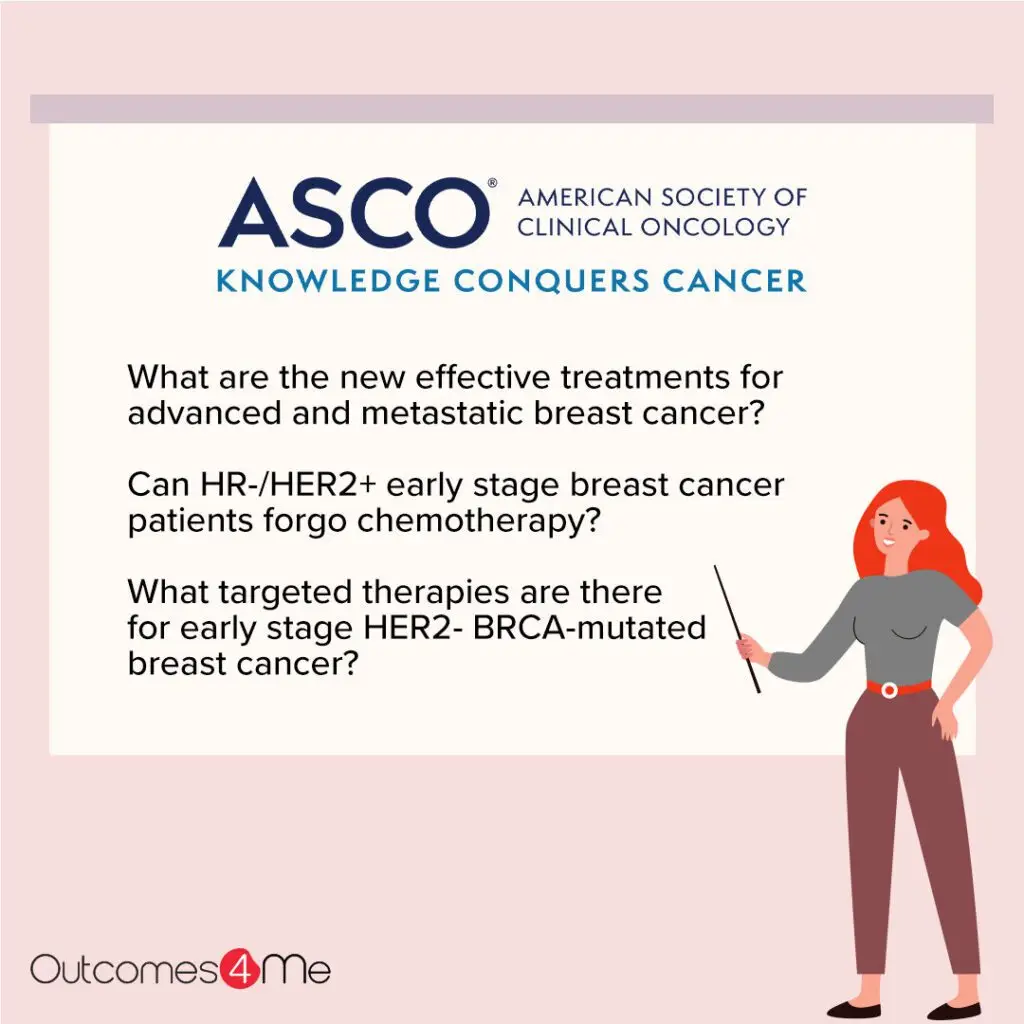
This past weekend the world’s top oncologists and cancer researchers virtually attended the American Society of Clinical Oncology (ASCO). Our team compiled the groundbreaking science specific to breast cancer, the latest trends in breast cancer clinical treatments and insights on equitable breast cancer care.
Targeted therapy for early-stage HER2 negative BRCA-mutated breast cancer pre- and post-surgery
Talazoparib(Talzenna), a PARP inhibitor, is currently approved in BRCA-mutated metastatic breast cancer. Researchers are currently studying talazoparib in early stage BRCA-mutated breast cancer. This phase II clinical trial evaluated the efficacy of neoadjuvant Talazoparib in HER2- BRCA-mutated early stage breast cancer. 46%-49% of patients taking Talazoparib prior to surgery experienced a pathologic complete response. This is comparable to standard anthracycline and taxane-based chemotherapy. Talazoparib was well tolerated with fatigue, nausea and alopecia being the most common side effects. Talazoparib will be studied in further neoadjuvant trials.
Another PARP inhibitor, Olaparib (Lynparza), is also being studied in the adjuvant setting for BRCA-mutated breast cancer in the OlympiA trial. The study included over 1,800 HER2-, BRCA-mutation breast cancer patients deemed to be at a high risk for recurrence. Participants received either Olaparib or placebo after surgery and chemotherapy. Olaparib reduced the risk of invasive breast cancer recurrence, second cancers or death by 42% compared to placebo. The three year iDFS rate in the Olaparib arm was 86% versus 77% in the placebo group. Olaparib also showed an acceptable toxicity. Olaparib showed promising results with this patient subgroup and may highlight the need for increased genetic testing even in early stage breast cancers as it may affect treatment options.
Novel effective treatments for advanced and metastatic HR+ HER2- breast cancer
New data from the phase 3 DAWNA-1 trial show that the CDK4/6 inhibitor Dalpiciclib may offer another treatment option for advanced breast cancer patients that have relapsed or progressed on previous endocrine therapy. In this randomized, double-blind trial, 361 patients were randomized to receive either Dalpicilib plus Fulvestrant (Faslodex) (dalp-fulv) or placebo plus Fulvestrant (PBO-fulv), with 251 patients receiving dalp-fulv and 120 patients receiving PBO-fulv. Median follow-up was 10.5 months. Interim analysis shows Dalp-fulv resulted in significantly greater investigator assessed progression free survival when compared to PBO-fulv (15.7 months v. 7.2 months). Compared to PBO-fulv, the most common serious adverse events neutropenia for patients on dalp-fulv were (84% v. 0%) and leukopenia (62% v. 0%). The study suggests dalp-fulv can be a safe and effective treatment for advanced or metastatic breast cancer patients after progression on endocrine therapy. Additional study data can highlight the value of dalp-fulv as a novel treatment for advanced HR+ HER2- breast cancer.
Alternative treatment strategies to minimize toxicity in HR+ HER2- breast cancer
The sysucc-002 phase 3 randomized control found that a combination of Trastuzumab (Herceptin) and an endocrine therapy may provide a less toxic, first line treatment option for metastatic HR+ HER2+ breast cancer patients. As part of this open-label non-inferiority trial conducted at 9 hospitals in China, 392 patients were enrolled to receive either Trastuzumab and chemotherapy or Trastuzumab and endocrine therapy. Using progression free survival as a study endpoint, the Trastuzumab and endocrine therapy combination was non-inferior to Trastuzumab and chemotherapy (19.2 months v. 14.8 months). The Trastuzumab chemotherapy combination resulted in greater toxicity than Trastuzumab and endocrine therapy, with increased frequency of the following symptoms: leucopenia (50% v. 6.6%), nausea (47% v. 12%), fatigue (24% v. 16%), vomiting (23% v. 6%), headache (33% v. 12%), and alopecia (64% v. 4%). The study suggests that Trastuzumab and endocrine therapy may offer a more tolerable treatment with equal efficacy.
Strategies to manage side effects and improve adherence
Dr. Luis lists a number of pharmacological and non-pharmacological strategies to manage the side effects of endocrine therapy. She listed both pharmacologic and non-pharmacologic evidence based strategies for musculoskeletal symptoms, fatigue, and vasomotor symptoms.
- Musculoskeletal symptoms: Physical activity, acupuncture, switching to a different medication, Duloxetine
- Fatigue: Cognitive behavioral therapy and physical activity
- Vasomotor symptoms: Antidepressants, anticonvulsants, oxybutynin, cognitive behavioral therapy
- Sexual Dysfunction: cognitive behavior therapy, switching medications from an Aromatase Inhibitor to Tamoxifen or Tamoxifen and ovarian suppression to Tamoxifen alone
Dr. Luis also mentions a number of clinical trials studying interventions to increase adherence. These studies include health applications with weekly medication reminders, personalized motivational letters or phone calls, web application support and others.
While endocrine therapy is fortunately effective in reducing risk of breast cancer recurrence, its prolonged duration and side effect burden can compromise quality of life. Reducing side effects through evidence based strategies is important in maintaining treatment adherence, and just as importantly, optimizing quality of life. Fortunately, research is growing on effective management side effect management strategies.
Outcomes4Me App may help increase patient engagement in their breast cancer care
Studies have shown that improved patient engagement results in increased satisfaction and better treatment outcomes. To increase patient engagement, Outcomes4Me conducted a pilot study to determine the feasibility of introducing the Outcomes4Me patient empowerment app within the standard of care experience of breast cancer patients. Outcomes4Me worked with medical oncologists at Massachusetts General Hospital to study App use in stages 1-4 breast cancer patients of the hospital. Between June 30 2020 and December 2020, the study enrolled 107 patients and surveyed them about their App experience over a course of 12 weeks. The primary endpoint of the study was defined as at least 40% of patients engaging with the app at least 3 times over the 12-week study period. During the study 60% of patients engaged with the app at least 3 times, meeting the primary feasibility endpoint. Additionally, 53% of participants said the app helped them track their symptoms and 33% said they were more likely to explore or enroll in a clinical trial after using the app. Our results suggest that use of a patient smartphone app may be helpful for many aspects of patient education and engagement for breast cancer patients. This type of intervention can help patients better track their symptoms and it may facilitate the management of side effects and improve clinical trials recruitment. Future research will evaluate the impact of the app on satisfaction with care decisions, management of treatment toxicity, and clinical trials recruitment.
Have questions?
In addition to making up to date research available, our medical team is here to help you understand the latest insights about breast cancer topics. If you have any questions or comments about this research–how it relates to your medical care, or wish to better understand the overall research on a particular topic–, you can reach out to us via the “Ask” tab in the Outcomes4Me App.
Sources
- Litton, J. (2021, June 4-8). Neoadjuvant talazoparib in patients with germline BRCA1/2 (gBRCA1/2) mutation-positive, early HER2-negative breast cancer (BC): Results of a phase 2 study. [Oral Abstract Session]. 2021 ASCO Annual Meeting.
- Tutt, A. (2021, June 4-8). OlympiA: A phase III, multicenter, randomized, placebo-controlled trial of adjuvant olaparib after (neo)adjuvant chemotherapy in patients with germline BRCA1/2 mutations and high-risk HER2-negative early breast cancer. [Plenary Session]. 2021 ASCO Annual Meeting.
- Xu B, Zhang Q, Zhang P, et al. Dalpiciclib versus placebo plus fulvestrant in HR+/HER2- advanced breast cancer that relapsed or progressed on previous endocrine therapy (DAWNA-1): A multicenter, randomized, phase 3 study. JCO. 2021;39(15_suppl):1002-1002. doi:10.1200/JCO.2021.39.15_suppl.1002
- Yuan Z, Huang J-J, Hua X, et al. Trastuzumab plus endocrine therapy or chemotherapy as first-line treatment for metastatic breast cancer with hormone receptor-positive and HER2-positive: The sysucc-002 randomized clinical trial. JCO. 2021;39(15_suppl):1003-1003. doi:10.1200/JCO.2021.39.15_suppl.1003
- Luis, I. (2021, June 4-8). Balancing Adherence and Quality of Life While Taking Endocrine Therapy. [Education Session]. 2021 ASCO Annual Meeting.
- Isakoff S, Said M, et al. Abstract 1570: Feasibility of integrating the Outcomes4MeTM smartphone navigation application into the care of breast cancer patients (FIONA). Poster presented at: 2021 ASCO Annual Meeting. June 7, 2021.



